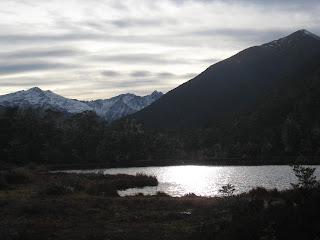Since I've arrived in Christchurch I've vacillated between "bring students" and "don't bring students" but the past few days the former has been winning out. For a couple of reasons. It isn't hyperbole to claim that Aotearoa New Zealand is the most beautiful place in the world. It really is. I mean it. I've visited much of this globe, and these little islands at the end of the world take grand prize. And, as the recent news about CO2 levels, melting polar ice caps, water shortages, and the commercialization of farmers' knowledge (metis) sinks in, I think it is important for people to take stock of what we have to lose if we don't act fast. Seeing the diversity of life, indigenous life, that flourishes in out of the way places was a wake up call for me in my youth, and it could have the same effect for young adults today. But this brings with it the "don't bring students" since our carbon footprint is massive when we travel this far. How sustainable is it to bring students 1/2 way around the world to see farmers and native plants existing in harmony? Really, you can watch the Lord of the Rings trilogy or The Hobbit and get a pretty good idea of what this place looks like. What value does it bring to travel this far to see something that is pretty well captured by Peter Jackson in film? For a start, having people tell you, to your face, what our (meaning US) consumptions patterns are doing to the rest of the world might count for something. When Kiwis point out how we haven't ratified Kyoto, it causes pause. When we sit down side by side with our counterparts in other countries and work together to find common solutions, it causes hope. Maybe it takes traveling to the other side of the world to rethink what you have at home. You question where your apples come from, or if you really need to turn on the air conditioning just yet. Do you need to hop in the car for the quick trip to the store, or will a bike suffice? these questions matter here in the Pacific, where there are island peoples who will stand to lose much more than us much more quickly, as their atolls and villages will be surrounded by rising water and they will have to move to countries like Australia or here to survive. Meeting Pasifika here who can detail what will happen to their families members in the short term if we don't change things might be worth the footprint. As long as we purchase some trees as offsets. Hei kona ra. [The views expressed here are solely those of the author, and do not represent the views of the Anthropology Program at Quinnipiac.]
If you look closely, you might see Bilbo Baggins crossing the Alps...

"Really, you can watch the Lord of the Rings trilogy or The Hobbit and get a pretty good idea of what this place looks like."
ReplyDeleteBut that would mean I would have to sit through the Lord of the Rings.
I think you should bring students!!!!
ReplyDeleteIf I can figure out a way to make it affordable for students, I'll do it.
ReplyDelete